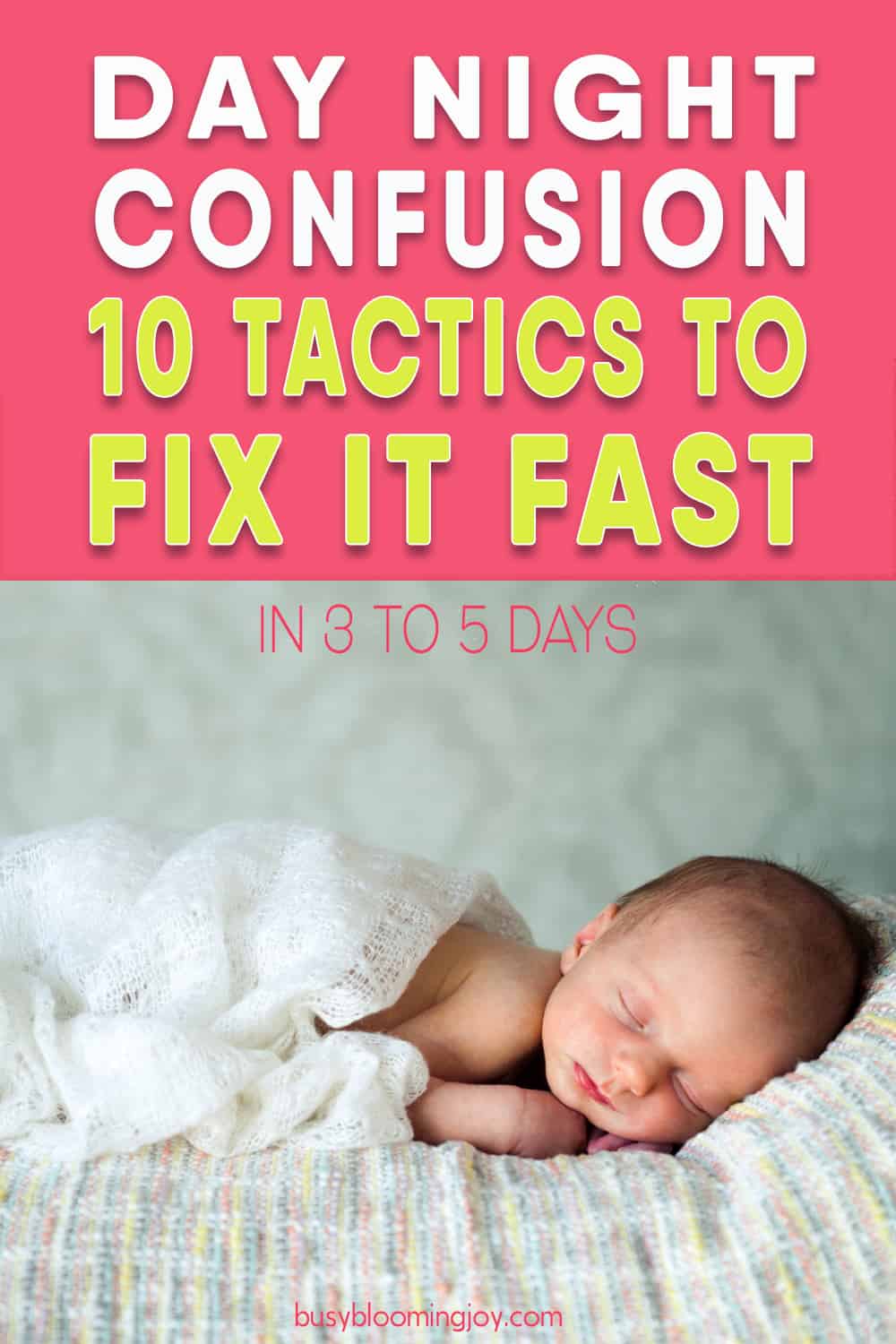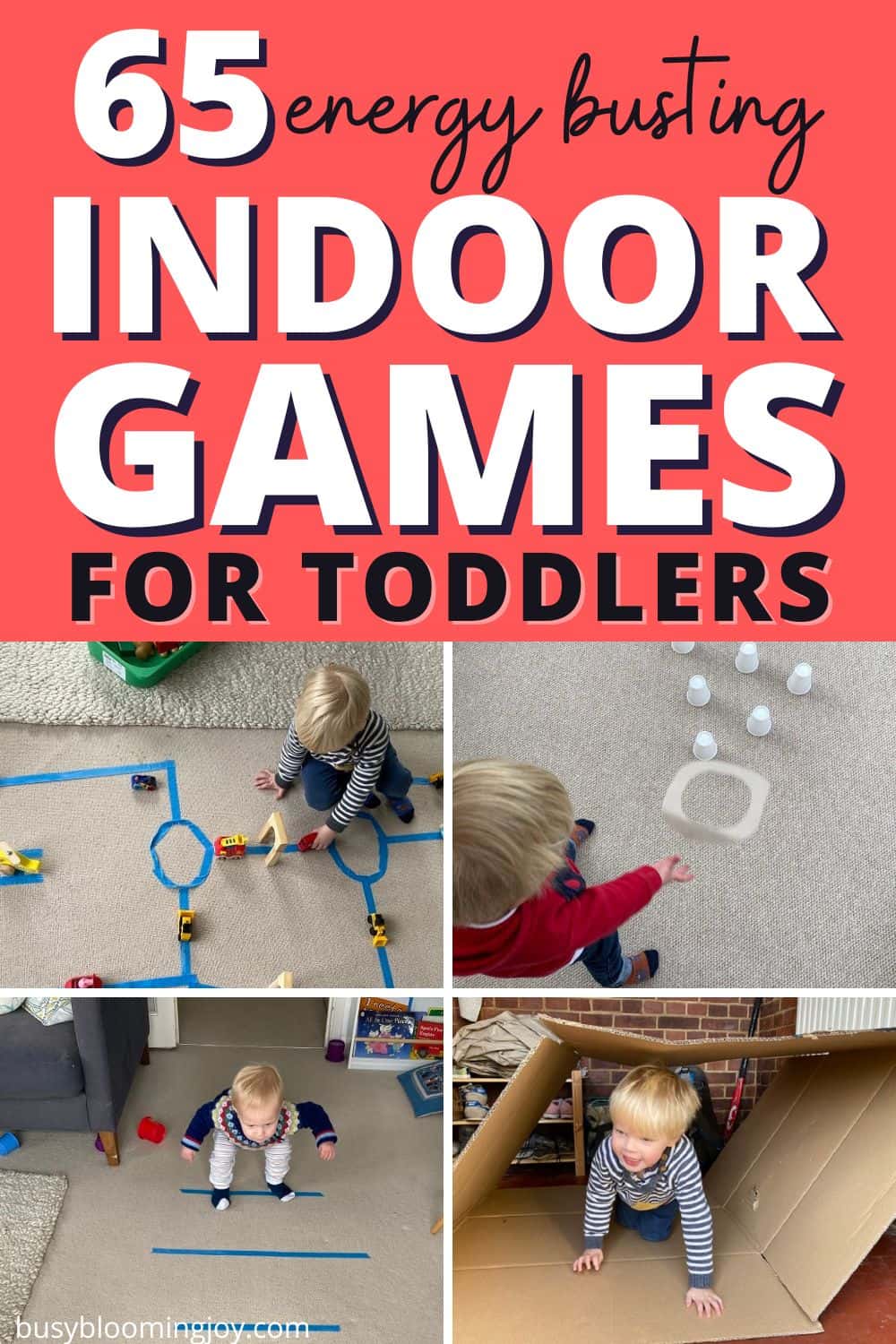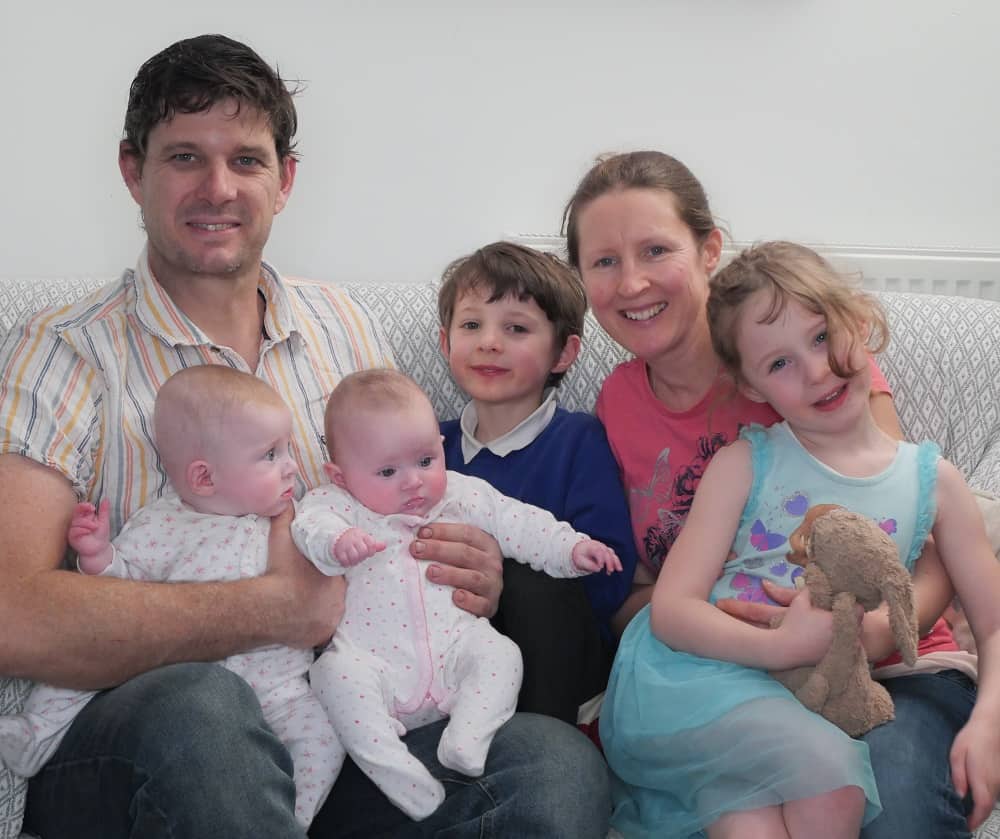Does your newborn sleep all day, then want to party all night? That’s day-night confusion. Unfortunately it’s all too common in newborn babies. But don’t despair, it can be very easily fixed in just a few days!
Of course, being still so tiny, your baby needs to feed frequently, both day and night. But instead of your newborn sleeping all day and only waking to feed, you want your baby to sleep all NIGHT, only waking to feed. Allowing you just a little a bit more sleep.
In the early days these awake periods may be no more than a grunt, wriggle, leg kick and stretch. But as your baby grows and these awake periods get longer, these frequent night ‘parties’ will be become less and less fun for you…So then it’s time to work on switching your newborn from sleeping all day to sleeping all night.
Newborn sleeping all day, wants to party all night? 10 simple tactics to switch it fast!
Table of Contents
ToggleNewborns love to sleep all day when first born
First, a brief look at why day/night confusion is common in newborns and why adults have a very clear sense of day and night.
Adults have strong circadian rhythms
As adults we naturally want to sleep at night and spend the daylight hours awake. This internal 24-hour body clock, present in much of the animal kingdom (from animals, to plants, to fungi and more), called a circadian rhythm, is regulated mostly by light. Light inhibits the sleep-inducing hormone, melatonin. So as darkness falls, melatonin levels rise, helping us to wind down and want to fall asleep.

Obviously in times of sleep deprivation (probably like now) you may want to fall asleep at any time of day or night. And sleep all day! However, the circadian rhythm can still be pretty strong. (Even when severely sleep deprived with a newborn, then quickly followed by a newborn and a toddler, I struggled to sleep in the day, which my husband just could not fathom… He can sleep whenever and where ever…what a skill!)
But newborns want to sleep all day
The sleep pattern of a baby rarely reflects day and early as a newborn.
Of course, newborns sleep so much in the early days, that whether it’s day or night they really only seem to be awake to feed.
But after a few weeks, when baby becomes a little bit more awake and alert, you will likely find baby is more AWAKE at night and still wants to SLEEP ALL DAY (only waking briefly to feed).
This is often termed day night confusion.
With no exposure to light, newborn sleep patterns don’t reflect day and night
In other words, they have yet to develop a mature circadian rhythm.
Why babies are born with day night confusion
So why is it common for a newborn to have completely the opposite sleep pattern…sleeping all day and wanting to party all night, when you want to sleep!
One theory is that during pregnancy, the sleeping pattern of an unborn baby follows the ACTIVE periods of the mother. The rocking sensation that the mother creates when the mother is awake and active, lulls baby to sleep. Then when mom sleeps, baby wakes up!
When pregnant, I was regularly woken in the night by my baby kicking fast and furiously (that and my desperate need to pee…) so this definitely held true for me.
If this is the case, it’s no surprise that at birth, your newborn’s sleep pattern tends to naturally to follow this same cycle… wanting to sleep all day long.
When will baby have days and nights sorted?
By 3-4 months your baby’s sleep pattern should have switched from day to night naturally, as the production of melatonin regulates to day and night.
Wow, that’s quite a time to wait!
Luckily newborns respond well to outside factors and synchronization to day and night can be sped up quickly and very easily.
For both of my newborns, I managed to iron out their days and nights in a matter of days. 3 and 5 days to be precise.
So fear not! You can change your baby’s sleep pattern from sleeping all day to sleeping all night, in 3 to 5 days!
Breastfed babies may switch earlier (vs. formula fed)
Tryptophan is the precursor to the sleep inducing hormone, melatonin. It’s an essential nutritional requirement since the body cannot make it. It’s therefore found in breast milk and infant formulas.
What’s clever, is that the levels of tryptophan in breast milk fluctuates throughout the day and night. In the evening and at night, levels of tryptophan rise. When baby feeds, the tryptophan they ingest facilitates the production of melatonin.
Higher levels of tryptophan ingested = more melatonin produced = more likely to sleep
This was just a theory for a long time but was eventually confirmed in this study; the sleep-wake patterns of babies fed formula, either with or without elevated levels of tryptophan, were assessed. Those fed elevated tryptophan at night, thereby mimicking nighttime breastmilk, developed improved sleep-awake patterns.
Want to fix day night confusion faster? (In 3 to 5 days?) Here’s how
Really we want baby to switch from sleeping all day to sleeping all night as fast as possible
Before we all die of exhaustion… Yes you can wait until your baby figures it out on their own, I have friends who have done that…. in the mean time they slowly wilt and suffer, bags under the eyes…. not enjoying their role as a mother, not enjoying their baby, not enjoying much at all.
So give these tactics a go – you won’t regret it!
The basic premise is to keep days more active and ‘day’ like (so baby is awake in day) and nights quiet, relaxed and sleepy – more ‘night like’.
These 5 tactics help keep your newborn AWAKE during the day
Let’s start with these
#1 Expose baby to natural light in the day
Exposure to plenty of light in the day is key to reversing day night confusion. Makes sense since the mature circadian cycle of an adult is governed mostly by light.
This study confirmed that newborns exposed to typical day/night light patterns adjusted their body clock within 7 days to show distinct rest-activity patterns in synch with day and night.
Where and when possible, natural daylight is better, since it tends to be much brighter and therefore more effective at doing its job and inhibiting melatonin.
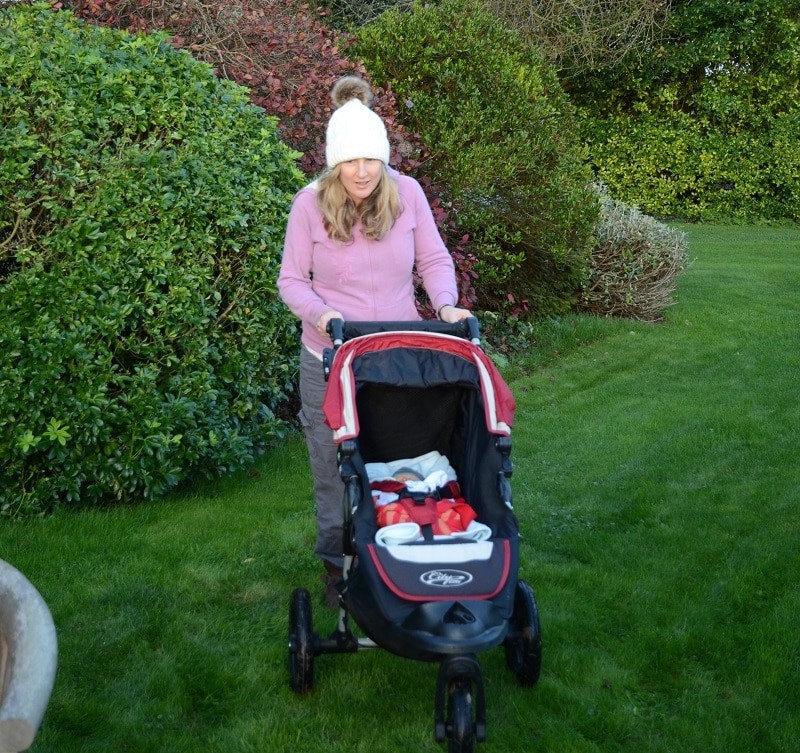
This doesn’t have to mean actually going outside! Obviously if it’s warm and dry and you’re able to, why wouldn’t you? But otherwise open the curtains and feed baby by the window. And keep the house as bright and light as possible.
Or if you’re desperate to get out the house and need a bit of fresh air to wake up (like I did in the photo above), wrap yourself and baby up well and get going!
The time to draw the curtains and dim the lights is when your baby is tired, and ready to have a nap. Less light will encourage the melatonin flow and let that baby sleep.
#2 Make sure baby is fully awake for daytime feeds
When your baby has woken to feed, or if you have to wake baby to feed, make sure baby shows a reasonable level of alertness and awakeness before starting a feed. This helps ensures baby stays awake during and after the feed.
Mmm, easier said than done! Yes, in the early days this is pretty difficult, but there are a few things you can do which can really help.
Unswaddling and a nappy change should rouse baby enough. If not a quick top-and-tail should do the trick. Try to get eyes open and full alertness before starting a feed.
If baby falls asleep when feeding, simulate another nappy change, top-and-tail again, try blowing on your babies hands and feet, open a window… anything to get baby to wake up!
#3 Encourage your baby to stay awake for short periods after feeding in the day
After your baby has finished feeding, a little interaction, stimulation or ‘baby play’ will encourage your baby to stay awake. In the early days this might literally be only for 5-10 minutes or so but will quickly build up from here.
Remember small babies can only stay awake for short periods in the beginning and awake time INCLUDES the time spent feeding.
Wondering how long baby should stay awake in between naps? Check out this baby sleep chart post.
Involving your baby in your daily activities will help build these awake periods
Involving your baby in your day-to-day chores and routine will mean your baby is likely exposed to the noise, lights and other stimulation that that brings. Babies are fascinated by their new world so will love watching you and the rest of the family as well as checking out new faces and all the shiny new objects at the supermarket and at the pharmacy etc.
Similarly, siblings tend to be very inquisitive about their new baby brother or sister, bringing them toys and peering at them, touching and prodding. Obviously this needs to be carefully monitored so eyes don’t get poked (why are eyes such a fascination?!) but use it to your advantage to stop your newborn sleeping all day.

#4 Wake baby to feed in the day
You may have heard that saying ‘you should never wake a sleeping baby’. Pah! You don’t want baby sleeping all day, so time to ignore that one!
Long periods of sleep in the day means periods of wakefulness at night. If a feed is due and baby is not yet awake, wake that baby up!
This is one of the 10 strategies I recommend to getting your baby to sleep through the night. Or in the early days, just getting a longer 3, 4, 5 or 6 hour stretch of sleep at night.
Not only will your baby be sleeping too much in the day, they will not be getting enough milk in the day = frequent wakings at night to feed are a certainty.
Related posts:
- Confused by your newborn’s sleep? The ULTIMATE guide to get you in the know
- Baffled by how much sleep baby needs? Baby sleep chart to the rescue!
- How to get your baby to sleep through the night: 10 steps for an awesome nights sleep, no cry-it-out
#5 Avoid overuse of a baby carrier
Baby carriers are an absolute life saver for a fussy baby, when you’re battling to get baby down for a nap or when you want to go for a walk and you know the buggy is not going to cut it in the mud (among a hundred other reasons).
But once baby is toasty warm and comfy, asleep on your chest, the chance of your baby waking naturally are limited! You are then encouraging your newborn to sleep all day.
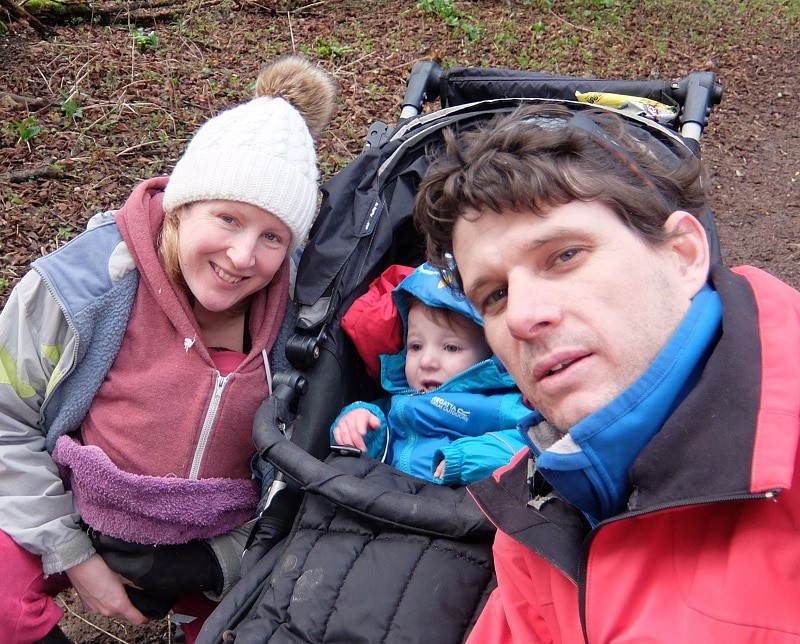
Once asleep, try and extract your baby and lie them down in their cot so they can continue their nap there. Or remove baby and wake them when they’re next due a feed.
These 5 tactics discourage activity at night (& AREN’T just the opposite of the first 5!)
In turn, this encourages more active periods in the day = no more sleeping all day long for your newborn!
#6 Use dim lights to feed at night
So in the day you want light to inhibit the sleepy hormone melatonin. At night you want to keep levels of melatonin high. So nightlight at the ready. Avoid turning on any bright lights and make do with as little light as possible. Set up a small lamp by the changing table and/or feeding chair giving you just enough light to do what you need to do.

#7 Avoid changing baby’s nappy at night, if you do need to change it, do so BEFORE feeding
Obviously a dirty nappy needs to be changed, but if it’s only a little wet, leave it. You should be able to judge pretty quickly how long you can leave a wet nappy before it needs changing.
If you DO need to change baby’s nappy, change it BEFORE a feed. You don’t want to unnecessarily stimulate your baby once baby is fed and ready to go back to sleep.
BUT if baby falls asleep when feeding before taking enough milk ignore this!
If your baby wakes again after a couple of hours or less and is hungry it’s likely he or she did not feed enough. So to encourage a good feed change that nappy, top-and-tail and work your magic to wake baby. Repeat during a feed, rousing baby again if she starts falling asleep. Try to get baby to take a little bit more milk and eek out the time between feeds.
#8 If it’s cold at night, do what you can to keep that bare bum warm during a nappy change!
A little cool air is ideal to help wake a baby so can be a great tactic to help wake a baby in the day and lengthen those awake periods. So at night it’s the last thing you want.
If it’s cold in the night, like you don’t want to get out from under the covers without layering up, cold, think how your baby is going to feel, bum exposed, being wiped with a cold wipe.
Both my babies were born in the middle of the English winter (brrrrrrr) and while the room always stayed within the recommended range of 16 to 23 degrees, that is pretty cold. I found a little fan heater which I turned on just for these middle-of-the-night changes. It blew warm air over the changing table and made a HUGE difference to how disturbing/stimulating a nappy change was.
A luke warm, rather than cold, wipe down (I used warm water and cotton wool) also helps.
#9 Feed baby swaddled at night
Like #7, avoid the added stimulation of fiddling about with the swaddle after a feed. Get that baby’s nappy checked, changed as necessary, wrapped and ready to sleep BEFORE starting a feed. In addition, that close hold of the swaddle, making baby feel secure and cozy, is a great facilitator of sleep. So this encourages sleep once baby has done feeding.
Again, if baby is still little and very, very sleepy and likely to fall asleep when feeding, both #8 and #9 are ones to ignore for now!
#10 Avoid any interaction at night

Tempting as it is, avoid long chats and playing with baby! A little eye contact is fine, but no long conversations, tickling, cooing…. Help your baby learn that night time is for sleeping and feeding only.
Keeping light levels low, a strategic nappy change and re-swaddle and ignoring your baby’s attempts to chat, will help reduce these awake periods during the night. In turn this will encourage longer awake periods in the day. So instead of your newborn sleeping all day, very rapidly they will be sleeping all night!
A note for the pumping mom…
This is another one for those who feed expressed breast milk for your other half or another willing (or unwilling!) volunteer to feed.
Feed milk pumped in the evening at night
As mentioned earlier in this post, the levels of tryptophan, used to manufacture melatonin (the sleepy hormone) found in breastmilk rise at night. Drinking this tryptophan enriched milk facilitates sleep in your newborn. Therefore, it makes sense to label this milk with the time it was expressed. Then use it at a similar time to the time in which it was pumped.
So at night, feed milk pumped in the evening/at night. Then…
Feed milk pumped in the day, in the day
No surprises here… pumped milk will have lower levels of tryptophan, so feed this in the day.
What about caffeine?
A little caffeine, whether or day or night, should NOT impact
Phew, you’re probably thinking! That first and subsequent cup of coffee was a life saver for me after a tough night with a newborn…
Like other foods ingested, only a tiny percentage of caffeine consumed by a breast feeding mother makes it into breastmilk, at around 1%. After ingestion, caffeine is present as soon as 15 minutes after and peaks at 1-2 hours.
Conclusive studies are limited on the effect of caffeine ingested by babies. Reportedly, a mother consuming 10 cups of coffee a day is likely to see jitteriness, extreme fussiness and interrupted sleep patterns in her baby, while drinking 5 cups of day has little effect.

Guidelines have been set at 300mg of caffeine a day for the breastfeeding mother
At this level, no caffeine is detected in the infant at all. That’s 2 to 3 cups of homebrewed coffee depending on strength; the caffeine levels in coffee bought in a café tend to be much higher (Starbucks Venti = 415mg).
(Don’t forget caffeine is also found in high levels in soft drinks, tea and chocolate: can of coke = 35mg, cup of tea = 30-80mg, 1 Lindt chocolate bar = 92mg. For more click here.)
In the context of switching your newborn from sleeping all day to sleeping all night, to be safe, rather get your caffeine fix in the morning. But if you’re desperate, it seems a little bit of caffeine is unlikely to affect your baby!
However, both babies and adults are react to and process caffeine differently. So if you do observe fussiness an hour or two after your daily dose, then it makes sense to be careful about when you do consume coffee or eliminate it altogether.
To read more about the effect of caffeine on breastfeeding this is a good read.
That’s all folks!
Well hopefully by following these simple steps you will have made the switch and your newborn will no longer be sleeping all day, but sleeping all night! Allowing you a bit more zzzzzzzzzzzzzzzz…..


